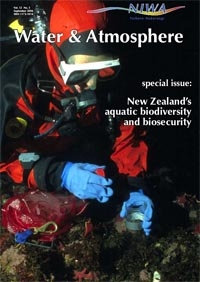PDF of this article (109 KB)

NIWA established the Centre in 2002 to enhance access to our scientific expertise and services, to develop new tools and techniques, and to increase awareness of aquatic biodiversity and biosecurity.
The Centre is underpinned by NIWA’s research capacity in physical and chemical oceanography, hydrology, marine geology, climate modelling, aquaculture and fisheries, as well as access to vessels and extensive marine and freshwater science research facilities.
Documenting and preserving our biodiversity
To manage our aquatic environment sustainably, we need to know as much as possible about our native fauna and flora. We are still in an exploratory phase, discovering and describing new species across many groups of organisms. In the marine environment, for example, although nearly 12,000 species have been described, that is less than half the estimated number of species. The Centre provides access to NIWA expertise and skills in assessing biodiversity – skills that can contribute to enterprise in aquaculture, fisheries, ecotourism, and biotechnology, as well as the conservation and restoration of aquatic habitats and communities.
Building biosecurity defences
Some non-indigenous species pose serious economic and ecological threats to our aquatic communities and seafood industries. Preventing their entry is the best protection against alien invaders, but early detection of those that do cross the border is almost as important.
Our scientists contribute significantly to biosecurity defences through the development of detection and surveillance techniques, methods to eradicate and manage aquatic pests, taxonomic capability, and the production of guides and publications to assist a wide range of clients.
For clients requiring services in both biodiversity and biosecurity, we provide research and consultancy in:
- risk assessment and modelling
- resource management advice
- identification services and workshops
- aquatic pest and disease assessment
- tools and guides to common species.
Our tools and services for aquatic environments also include databases, GIS services, habitat surveys, aquatic weed management strategies, habitat restoration studies, and identification of toxic microalgae and introduced marine species. Access to these products is available through the Centre’s web pages, where you’ll also find our latest update.
Protecting New Zealand’s natural heritage

We aim to foster collaboration and cooperation among organisations, specialists, and communities involved with aquatic biodiversity and biosecurity. To help accomplish this we work with central and local government, iwi and community groups, and private companies and other businesses.
We provide access to a growing baseline of knowledge critical for understanding and substainably managing our diverse aquatic environments. We also provide research to manage aquatic biosecurity threats. These skills can be used to help clients achieve the objectives of the New Zealand Biodiversity Strategy and the Biosecurity Strategy, and to help meet New Zealand’s responsibilities under treaties, conventions, and protocols affecting Antarctica and the Southern Ocean.
Contact
For further information, please contact:
Dr Barb Hayden Leader National Centre for Aquatic Biodiversity & Biosecurity
NIWA, PO Box 8602, Riccarton, Christchurch ph 03 348 8987 [email protected]
